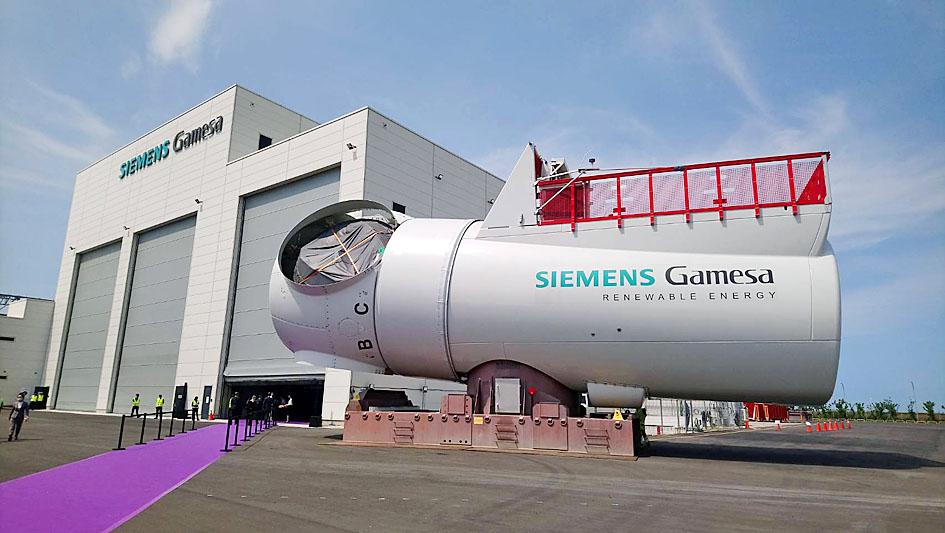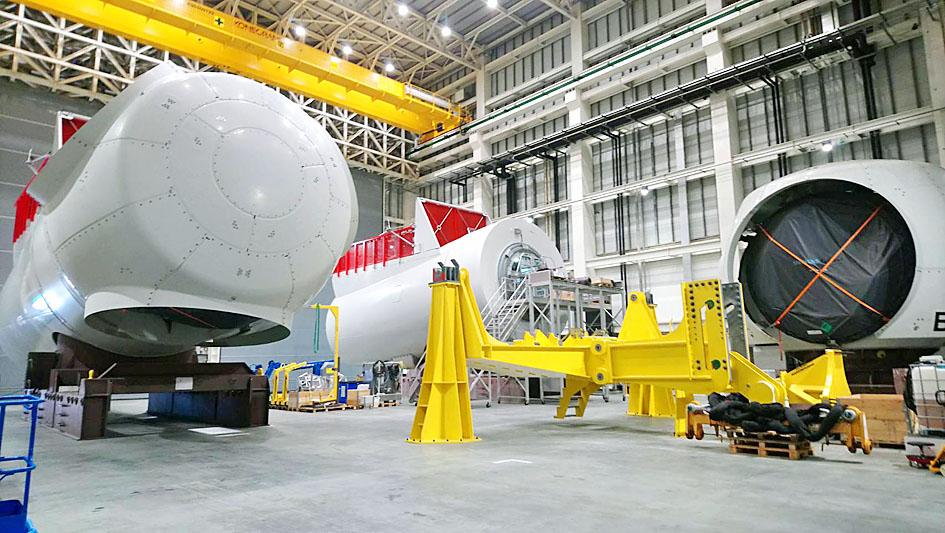Wind turbine manufacturer Siemens Gamesa Renewable Energy SA yesterday inaugurated Taiwan’s first nacelle assembly plant at the Port of Taichung, its first assembly facility for offshore nacelles outside Europe.
Vice Premier Shen Jong-chin (沈榮津), a long-time champion of Taiwan’s ambitions to become a regional hub in the offshore wind farm industry, described the plant as a “milestone” at a ceremony at the plant.
“The completion of Siemens Gamesa’s nacelle assembly plant is a milestone for the development of the offshore wind farm industry in Taiwan and a step toward localizing the supply chain,” Shen said.

Photo: Chang Hsuan-che, Taipei Times
“This is only the beginning. My great hope is for the company to continue to increase the level of local content for its nacelle assemblies,” he said.
The plant early last month completed the first made in Taiwan offshore wind turbine nacelle assembly.
Siemens Gamesa said its output would initially satisfy orders from Orsted A/S’ 900 megawatt Greater Changhua 1 & 2a Offshore Wind Farms projects.

Photo: Chang Hsuan–che, Taipei Times
Taiwan’s stage 3 offshore wind farm development plan calls for all nacelle assemblies to be made locally from next year.
However, Orsted Taiwan general manager Christy Wang (汪欣潔) said that the company is going “above and beyond local content requirements.”
“We look forward to on-time and on-quality delivery of wind turbines and nacelles next year,” Wang said.
Orsted A/S awarded the contract for the Changhua projects to Siemens Gamesa and asked it to accelerate the local assembly facility.
As a result, the locally made nacelles are expected to arrive significantly earlier than the government planned.
“We are very proud to once again deliver on our promises in Taiwan, together with our client Orsted, our contractors, and central and local authorities who have contributed and guided us throughout the process,” Siemens Gamesa Offshore for Asia-Pacific general manager Niels Steenberg said.
“With the right policy framework” the Taichung plant will eventually take on projects throughout the Asia-Pacific region, Steenberg said.
The plant has created approximately 80 direct nacelle technician jobs, the company said.
More than 160 tower sections have already been delivered and are stored at the port, it said, adding that the company is “on track” to deliver turbines to Orsted Taiwan for installation in the first quarter of next year.

South Korea’s equity benchmark yesterday crossed a new milestone just a month after surpassing the once-unthinkable 5,000 mark as surging global memory demand powers the country’s biggest chipmakers. The KOSPI advanced as much as 2.6 percent to a record 6,123, with Samsung Electronics Co and SK Hynix Inc each gaining more than 2 percent. With the benchmark now up 45 percent this year, South Korea’s stock market capitalization has also moved past France’s, following last month’s overtaking of Germany’s. Long overlooked by foreign funds, despite being undervalued, South Korean stocks have now emerged as clear winners in the global market. The so-called “artificial intelligence

NEW IDENTITY: Known for its software, India has expanded into hardware, with its semiconductor industry growing from US$38bn in 2023 to US$45bn to US$50bn India on Saturday inaugurated its first semiconductor assembly and test facility, a milestone in the government’s push to reduce dependence on foreign chipmakers and stake a claim in a sector dominated by China. Indian Prime Minister Narendra Modi opened US firm Micron Technology Inc’s semiconductor assembly, test and packaging unit in his home state of Gujarat, hailing the “dawn of a new era” for India’s technology ambitions. “When young Indians look back in the future, they will see this decade as the turning point in our tech future,” Modi told the event, which was broadcast on his YouTube channel. The plant would convert

‘SEISMIC SHIFT’: The researcher forecast there would be about 1.1 billion mobile shipments this year, down from 1.26 billion the prior year and erasing years of gains The global smartphone market is expected to contract 12.9 percent this year due to the unprecedented memorychip shortage, marking “a crisis like no other,” researcher International Data Corp (IDC) said. The new forecast, a dramatic revision down from earlier estimates, gives the latest accounting of the ongoing memory crunch that is affecting every corner of the electronics industry. The demand for advanced memory to power artificial intelligence (AI) tasks has drained global supply until well into next year and jeopardizes the business model of many smartphone makers. IDC forecast about 1.1 billion mobile shipments this year, down from 1.26 billion the prior

People stand in a Pokemon store in Tokyo on Thursday. One of the world highest-grossing franchises is celebrated its 30th anniversary yesterday.